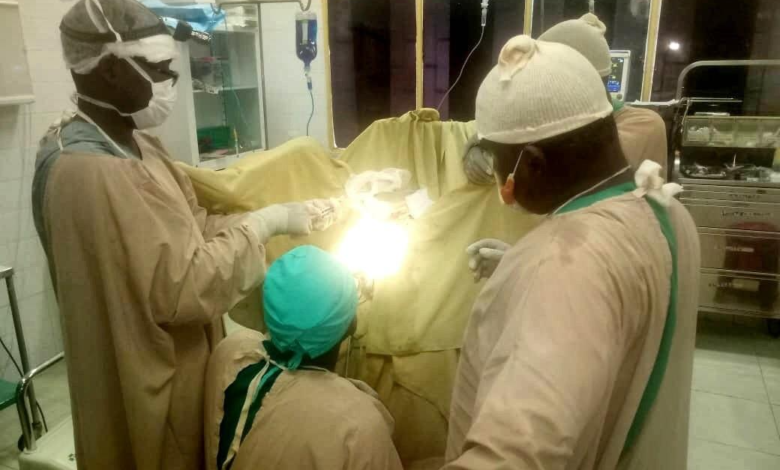Doctors In Cameroon Want Law on Abortion Changed
Unsafe abortions are responsible for 30 percent of maternal deaths in Cameroon. Medics in the country believe the law is a health problem and are leading advocacy for better legal responses to eligible abortion cases.

Enah almost died at 15 when she attempted an abortion at home.
She was five months gone when she was advised by a friend to use cassava roots to terminate her pregnancy.
After her mom passed away in Muyuka, Southwest Cameroon, Enah’s elder sister moved to the nation’s capital, Yaoundé, with her husband.
Enah stayed back home to continue school and help her father around the house. She finally stopped school in Form Three when separatist terror threats closed schools across the two English-speaking regions of Cameroon.
In 2017, separatists enforced a school boycott in the Anglophone regions, depriving over 700,000 children of regular school for four years.
Enah says a year later, in March, as she was hanging out with her boyfriend and his friends, they raped her.
Desperate
Realising she was pregnant three months later, Enah started making plans to abort, even though she did not have any money for the procedure.
“Since I was young and didn’t want to disgrace my family, I listened to my friend’s advice. We went to a man who told us to dig cassava roots and insert them so as to provoke an abortion,” she said.
“I was so desperate, so I did it when no one was at home. But, it was the most painful thing I have ever gone through,” she added.
When she started bleeding, Enah says she sat in a bucket and bled for at least two hours.
“I was getting weak and seriously bleeding. Everything became blurry. I didn’t even realise my Uncle had entered the house and was screaming. It was as if I would die,” she continued.
She was quickly rushed to a private hospital, where she regained consciousness. A medic forced her to reveal the cause of her predicament. She told them she was in the process of a homemade abortion.
Illegal
Cameroon’s penal code says any woman who procures an abortion can be imprisoned for a period ranging from fifteen days to one year or with a fine from $8 to $336. There are provisions allowing an abortion when a woman is raped or if the pregnancy endangers her life.
When these women can’t get abortions from authorised centres, they turn to traditional doctors, private clinics, and local drugstores. These illegal sites operate unperturbed.
Gender activist, Sally Mboumien, has not gotten over a procedure she underwent years ago. She shared her testimony in 2021 during an online campaign against unsafe abortions.
“25 years after I had a crude abortion at the backside of a drugstore, many in Cameroon are still going through that. The silence or pretence on this crucial issue by parents, some health practitioners, as well as policy and lawmakers, is appalling,” she posted.
The Society of Gynaecologists and Obstetricians in Cameroon say 30 percent of maternal deaths are caused by unsafe abortion. They want this to change.
Through their project, Advocacy for Comprehensive Abortion Care (ACAC) in Cameroon, they want lawmakers to reflect on the need to act urgently in order to reduce maternal deaths caused by abortion and to create awareness around the dangers of unsafe abortion, especially with eligible cases.
“We want the public to know that today, women are still dying of complications of abortion because they don’t know that the law provides particular instances where they can afford abortion care,” says Dr Mbashie Darolles, Secretary General.
Speaking last week during one of their advocacy campaigns in Yaoundé, she said the delays in getting authorisation for legal abortions make the problem worse.
“The challenge concerning the law is the application of the law because it is not a medical diagnosis to say that someone has been raped or not, but the decision of the judiciary and sometimes the procedure is very long.”
‘Lucky’
Sometimes women die or give birth while the procedure is still in court. SOGOC wants eligible cases to be treated in court within 72 hours.
A study on maternal deaths in Africa by the Guttmacher Institute in 2019, revealed 6.2 million unsafe abortions occur each year. Sub-Saharan Africa is said to have the highest rate, with 185 maternal deaths per 100,000 abortions. There has, however, been a decline today due to the increased use of contraceptives.
At the private hospital in Muyuka, the medics discovered Enah’s pregnancy couldn’t continue. They completed the process and aborted Enah’s pregnancy safely at the clinic.
Enah was not prosecuted for trying to abort her pregnancy, but if she had gone to a public hospital, it is more likely she would have been.
“They told me I was lucky to be alive because what I did was too dangerous. I feel bad about it, but I had no choice but to remove the baby since I was afraid of my father,” she said.
Enah says she doesn’t wish for anyone to go through what she did.
Support Our Journalism
There are millions of ordinary people affected by conflict in Africa whose stories are missing in the mainstream media. HumAngle is determined to tell those challenging and under-reported stories, hoping that the people impacted by these conflicts will find the safety and security they deserve.
To ensure that we continue to provide public service coverage, we have a small favour to ask you. We want you to be part of our journalistic endeavour by contributing a token to us.
Your donation will further promote a robust, free, and independent media.
Donate HereStay Closer To The Stories That Matter




